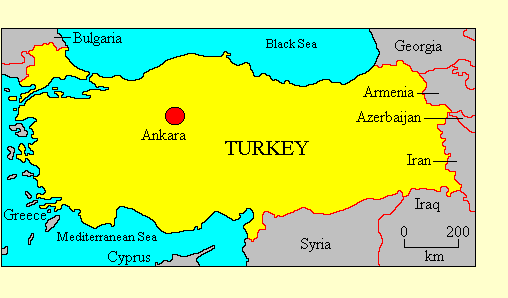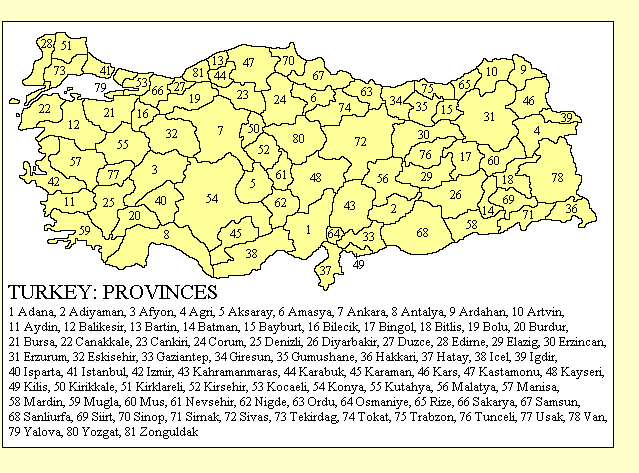
REPUBLIC OF TURKEY
• Official name: Turkiye Cumhuriyeti (Republic of Turkey)
• Location: Eastern Europe, West Asia
• International organisations: Council of Europe, Group of Twenty, North Atlantic Treaty Organisation,
Organisation
for Economic Co-operation and Development, Organisation of Islamic Conference, Organisation for
Security
and Co-operation in Europe, United Nations, World Trade Organisation
• Borders: Armenia, Azerbaijan, Bulgaria, Georgia, Greece, Iran, Iraq, Syria
• Coastline: Aegean Sea, Black Sea, Mediterranean Sea
• Land area: 780,580 Km2

• Population: 74,800,000
• Annual GDP (PPP) per capita: US$11,200 (2009 CIA estimate). World ranking: 76
• Ethnicity: Turkish 80%, Kurdish 20% (this figure is disputed). There are small minorities of
Armenians, Circassians, Greeks, Roma and other minorities
• Languages: Turkish is the official language and its use is mandatory in all public affairs.
Kurdish is widely spoken in the south-east but not recognised.
• Religion: Turkey is a secular state, but the great majority of the population are at least
nominally Sunni Moslems.
• Form of government: Parliamentary democratic republic. Turkey is divided into 81 provinces.
• Capital: Ankara
• Constitution: The Constitution of the Republic of
Turkey dates from 7 November 1982.
• Head of state: The President, elected by the National Assembly for a five-year term.
The President's functions are largely ceremonial. President
Abdullah Gul
was elected on 28 August 2007.

• Head of government: The Prime Minister, appointed by the President. The Prime Minister is usually the leader of the majority party in the legislature and is accountable to it.
• Legislature: The Great National Assembly of Turkey
(Turkiye Buyuk Millet Meclisi) is a unicameral legislature with 550 members, elected for five-year terms by proportional representation from each of the states.
• Electoral authority: Turkish elections are conducted by the
Supreme Election Board.
• Freedom House 2011 rating: Political Rights 3, Civil Liberties 3
• Transparency International Corruption Index: 44% (56 of 178 countries rated)
• Reporters Without Borders Press Freedom 2010 Index: 50.8% (138 of 178 countries rated)
• Heritage Foundation Economic Freedom 2010 Index: 64.2% (67 of 178 countries rated)
Political history
The Ottoman Empire, which was centered on the Turkish-speaking lands of Anatolia but was not a
Turkish national state, collapsed in the wake of World War I. The empire had made fitful efforts
to reform itself, and had held elections in the decade before the war, but had not established
responsible government. In 1923 Mustapha Kemal (later Kemal Ataturk) proclaimed the Turkish
Republic and became its president. Ataturk ran an authoritarian regime until his death in 1938.
After the Second World War President Ismet Inonu, who succeeded Ataturk, allowed a
multi-party system and free elections. In 1954 The Kemalist Republican People's Party was
defeated in free elections. But the Democratic Party government of Adnan Menderes was overthrown
by the army in 1960.
Democratic government was restored in 1961, but increasingly bitter political conflict
and the corrupt behaviour of many politicians led to another army coup in 1980. The army's
tendency to see itself as the guardian of Kemalist virtue is a continuing problem in Turkish
politics.
The military handed back power to a civilian government in 1989, but Turkish government
has remained essentially authoritarian, intolerant of dissent and repressive towards religious
and ethnic minorities (especially the Kurds).

Since the 1980s Turkey's traditional Kemalist party, the
Republican People's Party (CHP), has lost its dominant position in
national politics. Since the 2002 elections the governing party has been the
Justice and Development Party (AK), a moderate
Islamist party, which won a huge majority under the leadership of
Recep Tayyip Erdogan.
The AK maintained its dominant position at the 2007 and 2011 elections. The only other parties to hold seats
are the CHP and the rightist
Nationalist Movement Party (MHP). A number of Kurdish
members sit as independents.
The rise of the AK has posed a challenge to Turkey's tradition of authoritarian
secular nationalism, of which the army is the self-appointed guardian. Turkey also faces
divisive issues such as the situation in Cyprus and the country's application for
membership of the European Union. Erdogan favours EU membership, but the Kemalist establishment
fears that the enforcement of EU human rights standards would weaken their position, and give
unwelcome rights to the Kurds and other minorities. Conservative judges and security forces
worked together to undermine Erdogan and sabotage Turkey's EU membership bid. By 2011, however, Erdogan
had established such a dominant position that his agenda seemed beyond challenge.
Freedom House's 2011
report on Turkey
says: "Turkey is an electoral democracy... Political parties have been shut down for having a program
that is not in agreement with the constitution, a condition that could be interpreted broadly...
Reforms have increased civilian oversight of the military, but restrictions persist in areas such as
civilian supervision of defense expenditures. The military continues to intrude on issues beyond its
purview, commenting on key domestic and foreign policy matters... Turkey struggles with corruption in
government and in daily life. The AK government has adopted some anticorruption measures, but reports by
international organisations continue to raise concerns... The right to free expression is guaranteed in the
constitution, but legal impediments to press freedom remain. A 2006 antiterrorism law reintroduced jail
sentences for journalists, and Article 301 of the penal code allows journalists and others to be imprisoned
for discussing subjects such as the division of Cyprus and the 1915 mass killings of Armenians by
Turks... The constitution protects freedom of religion, but the state's official secularism has led to
considerable restrictions on the Muslim majority and others... Freedoms of association and assembly are
protected in the constitution. Prior restrictions on public demonstrations have been relaxed, but violent
clashes with police still occur... The constitution envisions an independent judiciary. The government in
practice can influence judges through appointments, promotions, and financing."
Updated November 2011
|


